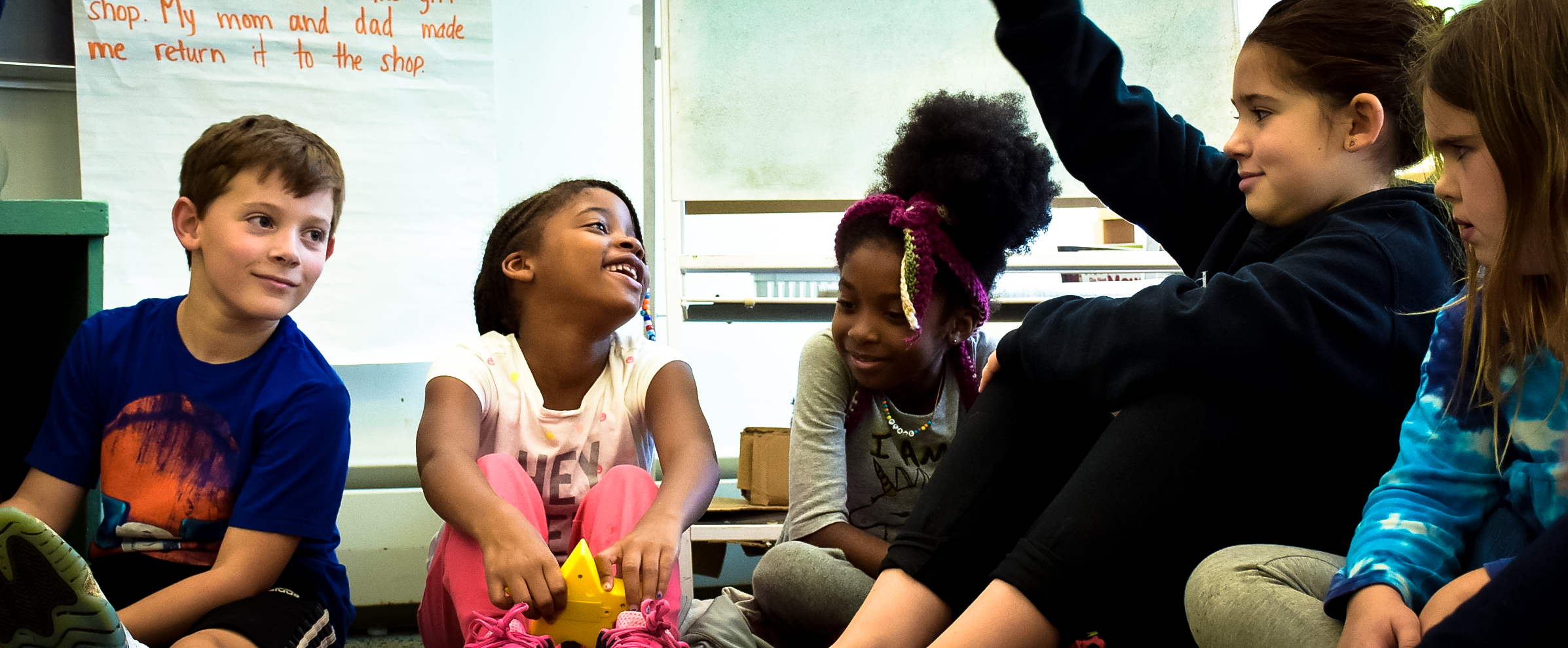Children encouraged to consider the experience of ‘the other’
From Susannah Wolf, Principal
For the past weeks and months, more and more of our Miquon children have tuned in to some rather serious current events. Without a doubt, there are many issues facing our country at the moment. We are aware that sources of information for children are wide and varied–they may be having discussions with friends and family at home, they may be viewing or listening to various media outlets (on purpose or by happenstance), they may be seeing signage in their neighborhoods, and of course, they are learning about these events at school (at age-appropriate levels, of course).
With this heightened awareness, we at Miquon are paying even closer attention to the work we always do: ensuring all viewpoints are respected and every individual is valued. With an anti-bias lens, children are encouraged to consider the experience of “the other” in any given situation. As we take on the complicated issues inherent in an election, inherent in the process of making a choice, we work to help children understand that there is no one right choice, but rather many different possibilities that are right for many different people.
Children have many ways of working to make sense of these big ideas and information; one of the most organic means is through play. Recently, children in grades 1-6 have been processing the election by running their own child-initiated, non-contentious kid-elections. On Friday at our monthly Good of The School assembly, the children discussed the role playing game they created — the potential election of a president of our woodland play space. In a discussion facilitated by three sixth graders, Miquon children named many concerns they had, but also identified that the idea of an election was fun for many, even those who had no interest in actually having a Miquon President.
Dramatic play gives children a chance to bring big topics into a world they can control, and exert their own ideas as they make sense of the world around them. Leading researcher in child psychology and early education Barbara Biber explained this well in her Vassar article: “[The child] projects his own pattern of the world into the play and in so doing, brings the real world closer to himself. He is building the feeling that the world is his, to understand, to interpret, to puzzle about, to make over.” As the children have been planning and discussing how elections work in their world at Miquon, they are working to understand the challenges faced by all candidates, as well as the electorate.
I want to take a moment to use Diane and Jeri’s class as another example that illustrates our efforts. What follows is Diane’s description of the work in their classroom.
“[Last week], the kids in my group began letters to the President-elect, whoever that may turn out to be. We talked about writing them before the election itself, and focusing on the issues of concern to each of us, rather than the person to whom the letter is addressed. (Hence, the writing [before] and not after the election.) We have steadfastly refused to enter into, or let them enter into the emotionally charged, hyperbolic speech we are all hearing all around us.
“They are taking this letter writing quite seriously, are thrilled that these letters will actually be sent, and some speculated what it might be like to have their letter read by or even referred to in a speech by the president. Their youth was so apparent and so refreshing.
“However, in the same class period, we also looked at fivethirtyeight.com again and studied some of the data reflected in the statistics — they are fascinated by that site. Their letter topics reflect the keen awareness they have, even at their young ages, of the deep issues in our world. They discuss race, poverty, environmental crises, war, etc.
“We are walking a fine line, balancing nurturing a growing awareness of the world and supporting their right to be children, even in challenging times. I suspect that the events of [this] week will require just such balancing.”
With this week being conference week at Miquon, the interesting twist in the schedule might be just the distraction our children need. With their assistant teacher and a dedicated specialist teacher, the children will spend the week delving deeply into themes ranging from inventions to Ghana to games. At the same time, next week we will be monitoring anxiety levels, making time and space for children to process current events through morning meeting, journaling, conversation, and play.
To support us in this effort, we ask that families please give your children opportunities to talk through what they understand about the election. One resource you might consider is Common Sense Media’s guide to discussing the election with children.
Talk together about how one might discuss election issues in public spaces — like school — where people from many backgrounds are coming together. We are a community that strives to honor a host of ideas and opinions. In the days and weeks following the election, our hope is for children to come to school ready to discuss how we might repair a country that has been somewhat divided, and how to move forward.
On Wednesday (or whenever it is settled), we may all need some unpacking of thoughts and feelings. Whether your candidate wins or loses, please know that Miquon is a place where every opinion, every family, and every child will be welcomed, valued, and respected.
